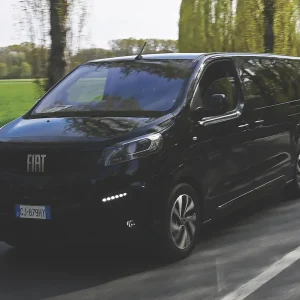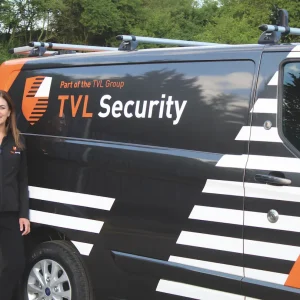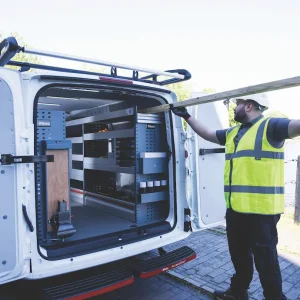On 1 September 2018, Dr Eckhard Scholz stepped down as CEO of VW Commercial Vehicles (VWCV) after more than four years in the role.
Despite inheriting a revitalised, and enormously successful, product line-up, his successor Dr Thomas Sedran, the former senior vice-president of group strategy for Volkswagen Group, has taken over the reins at a critical time for the future development of VW’s van division.
With hybrid and electric vehicles becoming a focus for manufacturers across the industry, Sedran, making his first public appearance as VWCV CEO, unveiled five new alternative-fuelled vehicles (AFVs) at the IAA Show in Hannover in September.
Electric production versions of the Caddy and Transporter were debuted as well as a hydrogen fuel-cell concept HyMotion Crafter, the autonomous driving ID Buzz Cargo concept, and an electric cargo bike.
Speaking exclusively to What Van?, Sedran was quick to emphasise the significance of the new models but underlined the balance AFVs play in the wider context of the industry.
“Electric powertrains are absolutely necessary for our offers in urban areas,” Sedran says, “but I personally think that for many applications diesel engines are still, from an economic and ecological aspect, the better powertrains.
“It’s a fact of life that some politicians believe we need to all go full-electric. I think the Volkswagen Group is working on bold plans to go full-electric, and there’s an opportunity for us to leverage those components for our [VWCV] offers.
“The ID Buzz Cargo is a brilliant example of leveraging the skills of the group in creating something truly valuable for the customers. We need these electric vehicles, because if you don’t sell a battery electric vehicle you don’t sell a combustion engine vehicle.”
Electrification is a growing concern as European-wide targets for manufacturers, due in 2021, will require product ranges to meet average CO2 targets, targets that will only be achieved through the widespread availability of zero-emissions vehicles. With the launch of its new AFVs, VW is already well on the way to meeting those targets, but could uptake be hampered by a widespread lack of investment in the charging or refuelling network for these vehicles?
“We have to think of renewable energies as just a contribution of reaching our parent company’s climate targets. I can’t imagine you will transport everything with a battery electric truck – this is insane.”
“[Charging] in the cities is a big question. I don’t blame anybody but right now there isn’t really a masterplan behind it, because if there was a masterplan you would also talk to utilities and be giving funding to create the infrastructure,” Sedran explains.
“I expect that to be really difficult, and all OEMs [original equipment manufacturers] across Europe will need to sell a lot of EVs going forward – 2020 onwards – very suddenly, and I’m concerned that the infrastructure is not there yet. Diesel is a must-have in commercial vehicles.”
 EVs are not the only concern for the new boss – increasing interest throughout the commercial vehicle industry means that autonomy is an ever-present topic and the ID Buzz concept goes some way to addressing those expectations.
EVs are not the only concern for the new boss – increasing interest throughout the commercial vehicle industry means that autonomy is an ever-present topic and the ID Buzz concept goes some way to addressing those expectations.
In his previous role as head of strategy for the group, Sedran was heavily involved in the future direction of all VW brands, from Seat and Skoda through to Audi and Porsche. Those previous responsibilities, he states, now put him in a good position at the helm of VWCV.
“I’m capable now of putting my stuff [VWCV] into perspective, and knowing how important it is compared to all the other stuff the board has to deal with,” Sedran explains. “The other thing is in my previous role I had to work with the top 200 decision-makers in the company. There’s a lot of personal relations and I call upon them right now.
Sedran is the new CEO of VWCV
“The big question is when is the best timing for introducing such a vehicle as the ID Buzz, because every new platform requires investment and how far do we jump? The big driver is what level of autonomy [the set of guidelines applied to autonomous vehicles] do we want to achieve. Is Level 3 sufficient? Or are we jumping to Level 5 or at least Level 4+? That’s something we are still working on but it’s the single biggest decision to make over the next six months or so, and when to launch that vehicle.”
Aside from future product developments within VW’s own ranks, Sedran also has the tricky job of negotiating a potential collaboration with Ford. The decision to form a strategic alliance across the two brands was revealed earlier this year, an announcement that at the time had Sedran’s name attached to it, citing “flexibility through alliances” and “challenging business environments” while also identifying CVs as the initial focus of the collaboration.
“We communicated that we are working on a number of programmes to assess what extent we work together [with Ford]. I tend to describe it as we are checking whether we want to decide if we get married. We had two marriages and two divorces before. For me the interesting piece is that even after two divorces we still talk about each other with a lot of respect, which is quite unusual – certainly with most divorces,” Sedran jokes.
“I think we both understand and see a lot of benefits of working together in light commercial vehicles as well as other parts of the business, but LCVs at this point is the programme which is most progressed. But it’s a third marriage – we have a lot of learnings from the first two, and we will take our time to be very diligent. It [the collaboration] will be on future models. If you look at the lifecycles of Ford and us they are pretty compatible.
“It leaves us time to work out how to differentiate vehicles, manufacturing footprint for the whole set up, and how we do engineering workload splits. There are a lot of options on the table and all I can say is that I’m confident there will be some very useful things coming out of it, but we are far away from calling it done.”
As former chief strategist, Sedran must now implement his own decisions from the hot seat as head of VWCV while balancing demand for several challenging changes within the product portfolio. More on any future relationship with Ford will however, Sedran says, have to wait until the end of the year.
George Barrow is the UK judge for the International Van of the Year, the prestigious prize awarded by leading European LCV journalists.





